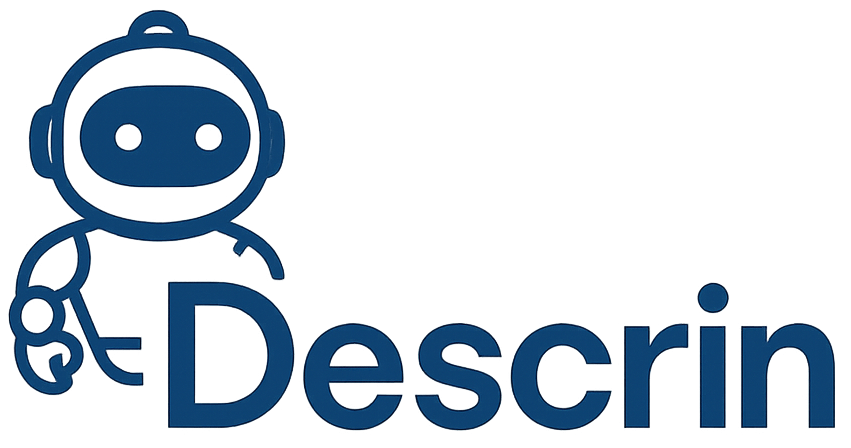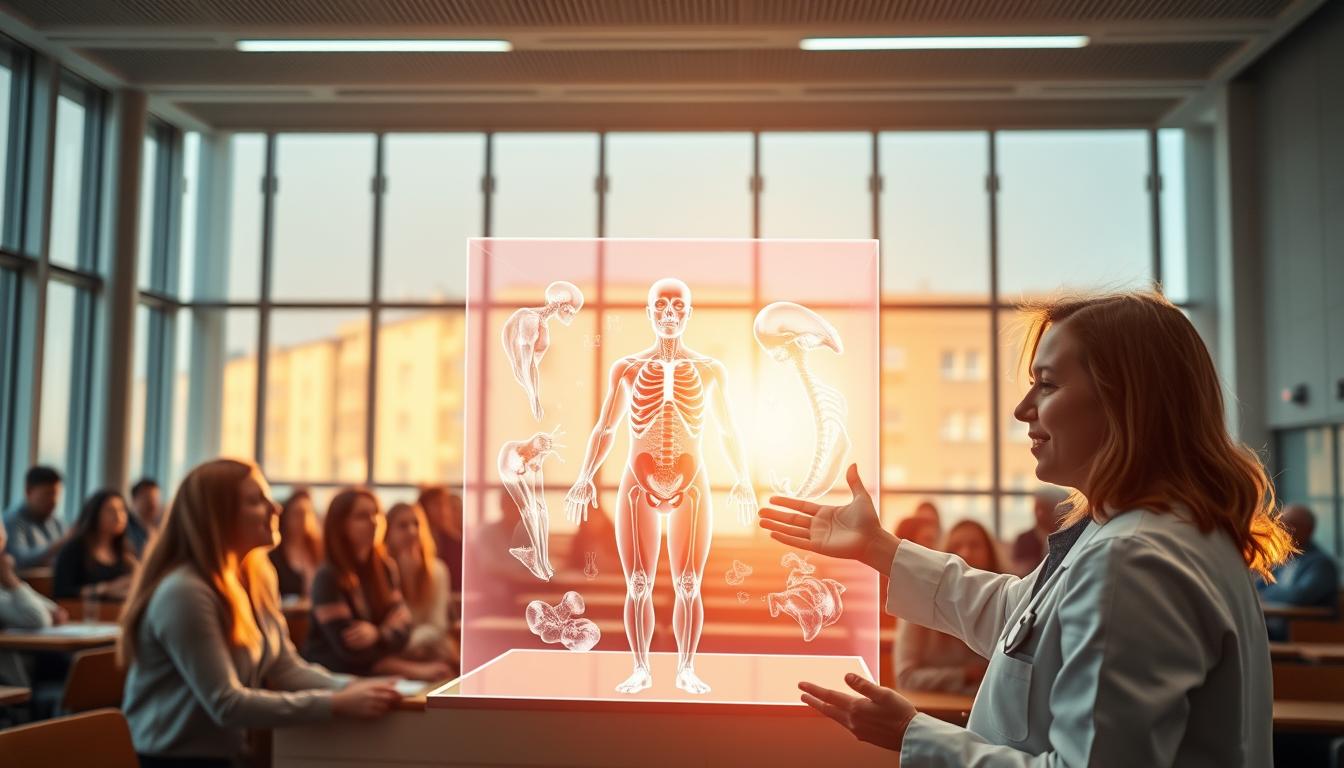AI Advancements Shaping the Future of German Med Schools

Imagine walking into a medical classroom where new tech meets old learning. This is the new norm in Germany. German universities are leading the way in using AI in medical studies. They’re getting ready the next doctors for a world where tech rules.
The change in medical education through AI is big. It’s changing how doctors will learn, diagnose, and treat patients. German schools are showing the way, mixing tech with medical skills in a new way.
AI is changing how students deal with tough health issues. It’s making learning better, care better, and doctors ready for a digital world. This tech change is a big deal for the future of healthcare.
Table of Contents
The Current State of AI Integration in German Medical Education| AI Advancements
Medical education in Germany is changing fast thanks to artificial intelligence. Schools are using ai-powered tools to help students learn better. This prepares them for a future where technology is key in healthcare.
German universities are leading the way in using new tech in medical training. Virtual patient simulations are now a big part of learning. They give students hands-on, interactive lessons.
Overview of AI Programs in German Universities
Many top German universities are working on AI plans:
- Charité – Universitätsmedizin Berlin is leading with AI in medical education.
- Technical University Munich is creating advanced virtual patient simulation platforms.
- Heidelberg University is using smart diagnostic training systems.
Key Stakeholders Driving Innovation
The change is thanks to a team effort:
- University research departments
- Healthcare tech companies
- Government research funding agencies
- Medical professional associations
Recent Technology Implementations
New ai tools are changing medical training. These include adaptive learning platforms and intelligent tutoring systems. They also have virtual patient simulations for realistic practice.
This digital shift means German medical students get top tech skills. They’re ready for today’s healthcare needs.
How AI is Transforming Medical Education in German Universities
Medical education in German universities is changing fast thanks to AI. AI is changing how students learn, practice, and get better at diagnosing. It’s making sure future doctors are ready for a tech-savvy medical world.
AI’s big impact on medical education includes:
- Personalized learning paths that fit each student’s needs
- Advanced simulation tools for real medical scenarios
- Real-time feedback and performance analysis
German medical schools are leading the way in using AI for education. Students get smart tutoring that’s tailored just for them. These systems look at how each student learns, finding out what they’re good at and what they need to work on.
AI is not replacing medical educators but empowering them to deliver more targeted and effective training.
With AI, students learn to work with big medical data. They use machine learning to understand medical images, spot patterns, and make better decisions.
AI is making medical education more interactive and personal. Students get to use the latest medical tools, getting ready for the challenges of the future.
AI-Powered Teaching Tools Revolutionizing Medical Training
Medical education is changing fast with new ai-powered teaching tools. These tools are changing how students learn and practice. They help students develop important clinical skills.
Now, medical training uses smart systems for learning. These systems tailor education to each student. They make learning paths that fit each student’s needs.
Virtual Patient Simulations
Virtual patient simulations give students a chance to practice without risk. They can:
- Interact with digital patient models
- Practice making diagnoses
- Work on communication skills
- Get feedback right away
Intelligent Tutoring Systems
AI is changing medical education with smart tutoring systems. These systems check how well students do and find what they need to work on. They give learning tips based on what students know.
Automated Assessment Platforms
New automated systems check how well students do. They use AI to give detailed feedback. This feedback is more detailed than old ways of checking.
A study in the United Arab Emirates showed AI simulations are good for checking skills. Teachers and students both like them a lot.
As medical education keeps changing, these tools will be more important. They help train the next doctors and nurses.
Data-Driven Diagnostics Training in Medical Schools

German medical schools are changing how doctors are trained. They use advanced data-driven diagnostics training. This includes AI in the curriculum, making learning complex skills easier.
Students get to work with machine learning algorithms. This lets them analyze big medical datasets. They learn to use AI tools for better patient care.
Students gain skills in:
- Pattern recognition in medical imaging
- Predictive health risk assessment
- Advanced clinical decision-making
- Personalized treatment strategy development
Now, medical education focuses on AI-driven diagnostics. Students learn to understand and use complex algorithms. These algorithms find medical signs that old methods miss.
| AI Diagnostic Training Component | Learning Outcome |
|---|---|
| Machine Learning Algorithms | Enhanced pattern recognition skills |
| Large Dataset Analysis | Improved diagnostic accuracy |
| Predictive Medical Modeling | Advanced risk assessment capabilities |
Data-driven diagnostics training is a big change in medical education. It prepares doctors to use AI in real-world healthcare.
Personalized Learning Pathways Through AI Technology
Medical education is changing fast with AI. German medical schools lead the way. They use AI to make learning fit each student’s needs.
AI is changing how students learn complex medical topics. The old way of teaching everyone the same is fading. Now, learning is tailored to each student’s needs.
Adaptive Learning Algorithms
AI makes learning environments that change as you go. These smart systems look at:
- How each student learns
- How well they remember things
- How they do in tests
- How well they understand
Student Performance Analytics
AI tools give deep insights into how students learn. They track important details. This helps teachers:
- Find where students need help
- Give focused help
- Recommend the right study materials
- Keep track of how students are doing
Customized Content Delivery
AI makes learning materials that fit each student’s learning style. This means students learn better.
The future of medical education is understanding individual learning needs through intelligent technology.
AI Ethics and Healthcare Education Integration

Integrating ai ethics into healthcare education is a big challenge for today’s medical schools. German universities are leading the way with new methods to tackle the ethical sides of AI in medical training.
Students face three main ethical areas when studying AI in medical education:
- Epistemic Ethics: Learning how AI algorithms make decisions
- Normative Ethics: Spotting biases in AI systems
- Traceability Ethics: Making sure AI decisions are accountable
Medical schools are working hard to get future doctors ready. They’re teaming up with experts from various fields to build strong ethical guidelines.
Ethical AI training is no longer optional—it’s a fundamental requirement for responsible healthcare innovation.
Important topics in ai ethics for healthcare education include:
- Looking into algorithmic bias
- Keeping patient data safe
- Understanding AI decision-making
- Creating clear AI assessment methods
By focusing on these ethical points, medical schools make sure doctors can use AI wisely and responsibly.
AI-Assisted Anatomy Lessons and Medical Imaging
Medical education is changing fast with new ai tools. German universities are leading the way. They use advanced tech to teach complex anatomy and medical imaging.
AI is making medical training better with interactive lessons. Students can explore the human body in detail. They get insights they never had before.
3D Visualization Technologies
Modern medical education uses top 3D tools. Students can:
- Rotate and examine anatomical models in virtual environments
- Zoom into microscopic cellular structures
- Understand complex physiological interactions
Interactive Learning Platforms
AI tools make learning fun and personal. They adapt to how each student learns. This helps students grasp complex medical ideas better.
Real-time Feedback Systems
Now, students get instant feedback on their skills. AI checks their medical imaging work. It gives them tips to improve right away.
These new tools are changing medical education. They’re preparing doctors and nurses with the latest skills and knowledge.
Research Advancement Through AI in German Medical Schools
German medical schools are leading the way in changing medical education with AI. They are using artificial intelligence to improve how students learn and tackle health problems.
AI research in German medical schools covers several key areas:
- Precision medicine development
- Advanced diagnostic algorithms
- Personalized treatment planning
- Medical imaging analysis
Universities like Charité – Universitätsmedizin Berlin and Munich’s Technical University are at the forefront. They are working together, combining medical and computer science knowledge. These partnerships are creating new solutions that mix technology with real-world healthcare.
“AI is not just a tool, but a transformative force in medical research and education,” says Dr. Klaus Werner, AI research director at a leading German medical institute.
Understanding AI will become crucial for your future in medicine. German medical schools are training students to use AI in healthcare. They aim to make students into clinician-scientists who can lead in healthcare innovation.
Research is focused on creating AI tools for several goals:
- Predicting disease progression
- Improving personalized patient care
- Making medical decisions easier
- Speeding up drug discovery
By diving into AI research, students in German medical schools are getting ahead. They are learning skills that make them leaders in medical technology and innovation worldwide.
Challenges and Implementation Barriers
Adding AI to medical studies is tough for German universities. Studies show big hurdles to using new tech in teaching medicine. Schools need smart plans to get past these problems.
Some big challenges include:
- Lack of specialized AI training for faculty
- Limited awareness about AI’s educational potential
- Resistance from traditional medical educators
- High financial investment requirements
Keeping data safe is a big worry with AI in medical education. German schools must build strong security systems. This is to protect personal info of students and patients.
“The digital transformation in medical education requires comprehensive strategic planning and institutional commitment.” – Dr. Klaus Müller, Medical Technology Expert
Money is a big issue in using AI in medical studies. Schools need a lot of money for tech, teacher training, and updates.
There’s also a problem of unequal access to AI tools. Making sure all schools and students can use these tools is a big challenge. It needs teamwork to solve.
- Develop standardized AI training programs
- Create comprehensive funding mechanisms
- Establish inter-university technology sharing platforms
By facing and solving these problems, German medical schools can use AI well. This will help train doctors for a future with lots of tech.
Future Prospects and Development Roadmap

Medical education in Germany is changing fast thanks to artificial intelligence. As research in German schools grows, universities are getting ready to use new tech in teaching. This will change how doctors are trained.
There are several key steps in this change:
Emerging Technologies on the Horizon
- Advanced natural language processing for medical documentation
- Augmented reality simulation platforms
- Predictive analytics for personalized learning experiences
- Intelligent diagnostic support systems
Planned Curriculum Innovations
Medical schools are updating their courses to include AI. They plan to:
- Add AI and digital health courses
- Use machine learning in clinical training
- Teach better data interpretation
- Include workshops on ethical AI use
Strategic Industry Collaborations
German universities are teaming up with tech firms and healthcare groups. These partnerships aim to:
- Make AI work in real healthcare settings
- Offer internships
- Match academic training with industry needs
- Support new research ideas
The future of medical education in Germany is looking bright. It will be digital, smart, and ready for today’s healthcare challenges. Students will learn in a way that prepares them for the tech demands of modern medicine.
Conclusion
Exploring how AI changes medical education in German universities shows a big shift. Technology is making healthcare learning more dynamic. This change brings new ways to train future doctors and nurses.
AI in medical education is more than just tech. It’s about getting students ready for tough healthcare issues. German schools are mixing old medical knowledge with new tech skills. This way, they make sure doctors are ready for today’s healthcare world.
Learning about medicine today is very different from before. AI tools, virtual patients, and data training are now real. These tools make learning fit each student’s needs, making education better and more focused.
The future of AI in medical education looks bright. German universities focus on using tech right, keeping ethics in mind. As you grow in your medical career, using these new tools will help you stay ahead. You’ll be ready to face today’s medical challenges.
FAQ
How are German universities integrating AI into medical education?
German universities are using AI in many ways. They have virtual patient simulations and systems that help students learn. These tools make learning more interactive and personalized, getting students ready for the future of healthcare.
What types of AI-powered teaching tools are being used in German medical schools?
Medical schools use advanced tools like virtual patient simulations and systems that guide students. These tools create real-life practice environments and help evaluate student performance. They make medical training better and more efficient.
How does AI support personalized learning in medical education?
AI helps with personalized learning by adapting to each student’s needs. It uses data to tailor content and improve learning. This approach makes learning more engaging and helps students remember what they learn better.
What ethical considerations are addressed in AI medical education?
German universities focus on AI ethics in their programs. They teach about bias, privacy, and AI’s role in healthcare. Experts from different fields work together to ensure AI is used responsibly.
How is AI transforming anatomy and medical imaging education?
AI is changing anatomy and medical imaging education with 3D models and interactive platforms. Students can explore detailed models and get feedback in real-time. This improves their understanding and skills in medical imaging.
What challenges exist in implementing AI in medical education?
Implementing AI in medical education faces several challenges. These include integrating AI into curricula, training teachers, and managing costs. Universities are working to overcome these by developing strategies and collaborating with others.
What future technologies are expected in medical AI education?
Future technologies include advanced language processing and augmented reality. German medical schools are updating their curricula to include AI in all areas of education. This will prepare students for the future of healthcare.
How are German universities preparing students for AI-driven healthcare?
German universities are preparing students with comprehensive AI training. They focus on technical skills, ethics, and practical use. Students learn to use AI for diagnostics and develop critical thinking skills for a tech-driven healthcare world.







